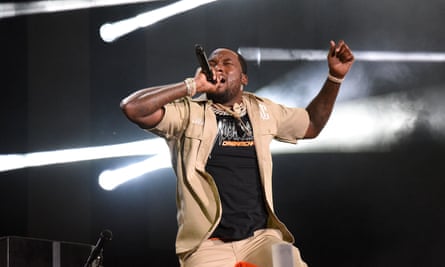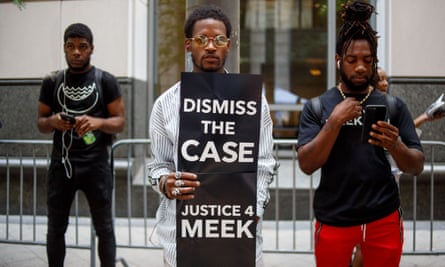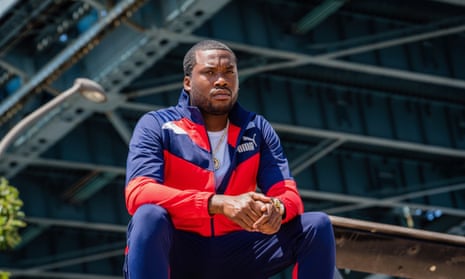The first time Meek Mill took part in a rap battle, he left in tears. “The guy battling me was 16 years old, and I was 13 or 14 – he was more advanced than me,” the 31-year-old recalls. “I lost by a long shot, but it gave me ambition. I told everybody before I left: ‘One day, you all will be playing my music.’” Hours before we sit down to chat in a ritzy Manhattan restaurant, the rapper’s fourth proper studio album, Championships, goes into the US charts at No 1. It is his second chart-topping record, after Dreams Worth More Than Money in 2015.
As he sips camomile tea with a side order of raw ginger, Meek – real name Robert Rihmeek Williams – carefully unlocks a giant, diamond-studded chain, and places it on the table with the care of Indiana Jones swapping idols in Raiders of the Lost Ark. “I’m sick as hell right now,” he croaks between sips. His whirlwind schedule doesn’t allow for much rest; he’ll be whisked across town to tape an appearance on The Daily Show after our conversation and has just come from the set of a film about urban dirt-bike riders, 12 O’Clock Boys. It’s his acting debut, portraying a character who “[reflects] on myself – someone who’s been in prison and comes home and tries to change his life”.
The release of Championships should be a triumphant moment for Meek. His strongest record yet, it pairs Meek’s penchant for full-throated intensity with glossy, cavernous beats. With its big-deal guest appearances, it has already made headlines, from speculation about whether Jay-Z’s pointed lines on What’s Free address Kanye West’s newfound Donald Trump fanaticism, to Meek’s team-up with his one-time rival Drake on Going Bad. “I think it’s healthy when it’s competition – it’s our job,” Meek says, stating that any bad blood between him and Drake is now firmly in the past. “Jay wasn’t talking to Kanye – he was talking to whoever was influencing Kanye. I never viewed that as a diss when I put it on my record.”
The album arrives at a time when public goodwill towards Meek has never been stronger. “Getting support from the people is always a great feeling,” he says. He has needed it over the past 18 months. His history of legal troubles, culminating in a five-month jail stint last year, can be traced back to his upbringing in north Philadelphia, where his family moved following the death of his father when Meek was five.

“Growing up in the rough neighbourhoods in America is all the same – coming up around drugs, violence, murder,” he says. “The police are there, but not to the level of protection. Coming up in a ruthless environment as a kid, you learn from what you see.” He relied on female role models, from his sister and mother to the music of Deborah Cox and Lauryn Hill. “It made me look at women as stronger,” he says. “My mom did everything for us – I’ve always viewed her as a man and a woman, all in one. It made me think all women were extremely strong and manly.”
His uncle, the Philadelphia-based DJ Grandmaster Nell, played hip-hop records for Meek at his grandmother’s house, and Meek developed his distinctive flow – imagine a sentient air horn, or a boxing announcer’s theatrical timbre turned up to the max. “If you were to walk out [of] here and someone drove by half a block away, playing my music loud, you could still hear my voice,” he claims, citing Jay-Z’s protege Memphis Bleek as a formative influence.
Throughout his adolescence, scuffles with police were a constant. Meek estimates that by the age of 18 he had been arrested 10 times for charges that didn’t stick. Then, in January 2007, he was arrested for illegal gun possession – and his decade-long legal troubles began. “I was carrying a gun because I felt I needed it to survive,” he says. “Even if you put me back in that situation right now, I’d still carry that gun. People like me die on a daily basis.” When the cops approached him in south-west Philadelphia, Meek claims, he tossed the gun to the ground and lay on the ground, preparing for arrest; the arresting officer, Reginald Graham, maintains that Meek instead pointed the gun directly at him. “From there on in, it was lights out,” Meek alleges. “I was getting knocked out.
“I was prepared to face the consequences,” Meek says of the gun charge, but the cops also charged him with drug dealing and assaulting a police officer. The guilty verdict led to a one-year prison sentence and 10 years’ probation. Prison conditions – showering amid excrement-smeared walls, washing his underwear in the sink, navigating soap shortages – stay with Meek. “It was a big transition,” he says. “I had to adapt.”
To this day, he contests the dealing and assault charges, and he’s not alone; in March last year, Philadelphia’s district attorney cast doubt on Graham’s original report. “In the ghettoes of America, if you’re a young man pointing a gun at a cop, you’re dead,” is Meek’s comment on the accusation. “Police officers will tell you: ‘We’re trained to kill you if you threaten our lives.’ That’s normal.”
When the judge Genece Brinkley was assigned to preside over his probation, Meek hoped she would show a measure of sympathy for his situation: “She’s a black judge. She comes from my neighbourhood.”
After a brief dalliance with TI’s Grand Hustle label, Meek linked up with the Miami rapper Rick Ross’s Maybach Music Group, but his rise to stardom was interrupted by legal difficulties. After a party celebrating the release of Meek’s 2012 debut, Dreams and Nightmares, he was briefly detained by police after a car he was riding in was pulled over (no charges were filed). “It always felt to me that, as I got bigger, things got worse,” he says.
As the years passed, it became increasingly clear that Brinkley was not the sympathetic figure that Meek had hoped for. The probation officer she assigned to him would allegedly phone at 6am every day, demanding to know his every move, even though he wasn’t under house arrest; in 2013, Brinkley ordered him to attend etiquette classes because of his perceived rudeness during court proceedings. The judge would apparently show up to his court-ordered community service unannounced, and, during a private meeting with Meek and his then-girlfriend Nicki Minaj in 2016, allegedly asked him to record a cover of Philadelphia R&B legends Boyz II Men’s track On Bended Knee and dedicate a lyric to her. “I didn’t want to laugh in her face – she had my life in her hands,” Meek says. “Jay-Z said: ‘If I hadn’t sent nobody to court to see what was going on with you, I would’ve never believed what you were saying – it sounded too outrageous.’”

That same year, his present probation officer recommended a six-month stay in rehab to help Meek deal with the “on-and-off” Percocet addiction he had developed while dealing with the pressure of regular court appearances. “The last time I took it was in 2016 – right before I went to court – because I was so nervous,” he says. The treatment worked, but in November 2017 Brinkley cited the failed drug test that prompted the treatment – as well as assault charges that were later dropped – while sentencing Meek to two to four years in prison for breaking his parole.
He went back to jail, spending most of it in solitary confinement because of his celebrity. It was “hell on earth”, he says. “I was going crazy – I could only wash every four days, I was depressed from facing two to four years. They put me on the block with crazy people. When my lawyer came to see me, I said: ‘Did I lose my mind?’”
While Meek was isolated from the outside world, fans were rallying in his support, from protests on the streets of Philadelphia to big-name supporters ranging from Jay-Z to the basketball player Joel Embiid. During the 2018 Winter Olympics, the Slovenian snowboarder Tit Stante appeared on television with “Free Meek Mill” written on the tip of his board. “It was shocking to me,” Meek says. “When you grow up in a wild environment, you don’t get support, so that was big for me.”
Released on bail in April 2018, after the Pennsylvania supreme court overturned his 2017 sentence, Meek called for the criminal justice system to be reformed. When he was invited to Trump’s White House, however, he said no. “It was too risky – I didn’t want to attach myself to that.”
He remains vocal about everything from probation and bail to who ends up in prison and what they must endure there. “I could piss in an alleyway out here, and a cop could pull over and lock me up with killers,” he says. “They got guys with DUIs in there alongside real rapists and gangsters. The system places you in a fuckin’ ruthless environment, where people are getting raped and stabbed – and they’re never the same when they come out.”
But while Meek’s legal team continues to file appeals to have Brinkley removed from his case, to put an end to his probation, and to overturn his original 2008 conviction, he has no intention of becoming a full-time activist. “I don’t want to become the face of [reform] because I’m not a perfect person,” he says. “I want to be a good father [he has two children, Rihmeek and Murad, with his former girlfriend Fahimah Raheem], make a lot of money and help bring change if I could. I’m always attached to my neighbourhood.”
But the shadow of the legal system still looms large. “I always hear rumours of groups of law enforcement investigating me, watching over me,” he says. “That always puts fear in my heart. I tell my friends – even the most powerful ones – always to stand behind me because there are always people out there who want to show me as someone I’m not. It scares me.”
